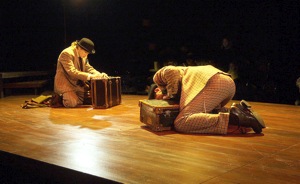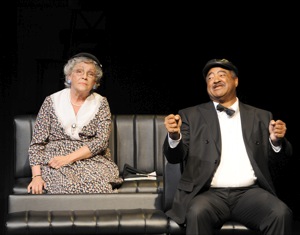-
- Across nation, same-sex marriage advocates protest ban
- Mormon church condemns gay activists for ‘attacks’
- Complaint filed over Mormon aid to Prop. 8
- Calif. clerks: When does gay-marriage ban begin?
- Gay activists rally outside Mormon temple in NYC
- Foley breaks silence on sex scandal
- National News Briefs
- World News Briefs
Theater
Two can’t-miss shows
Published Thursday, 20-Nov-2008 in issue 1091
‘Rosencrantz and Guildenstern are Dead’
Something is askew in any universe in which you can flip a coin and come up with 92 consecutive heads.
That’s not the only thing amiss in Tom Stoppard’s Tony-winning Rosencrantz and Guildenstern are Dead, playing through Nov. 22, at the Mandell Weiss Forum Studio. Performed by the UCSD graduate students, the show is directed by second-year MFA student Adam Arian.
The play’s protagonists are those two minor characters from Hamlet, dressed like Estragon and Vladimir and with a similar communication style. Summoned to Elsinore by King Claudius but mystified about the reason, they await the arrival of someone from the court to fill them in. Meanwhile, they spend their time debating some of the problems that plague Hamlet – fate, free will and the illusion of choice.
The Player (Irungu Mutu) and his itinerant troupe of Tragedians with outrageous costumes and hints of sexual possibility (Guildenstern calls them “a comic pornographer and a rabble or prostitutes”) offer diversion for a price, and this succinct definition of tragedy: “The bad end unhappily, the good unluckily. That is what tragedy means.”)
The play careens between snippets of the Shakespeare play (these actors are color-coded in black and white) and the existentialist universe.
Stoppard burst onto the world scene in 1966 with this, his first commercially produced play. Stoppard’s plays are outrageous, word-heavy romps that brook no attention lapses and offer no answers to the questions raised. Rosencrantz and Guildenstern flounder around in a world they neither understand nor control, but audience empathy is aroused by their humanity and the fact that they do not share our knowledge of their fate.
The play presents huge directorial challenges, and Arian rises to the occasion with clever staging that offers visual interest to accompany the word-drunk script.
Wu and Watkins are excellent individually and terrific foils for each other, speaking as much with expression and movement as with words. Mutu is also a standout as the Player, ready with his troupe to change reality to suit your whim.
Shakespeare, existentialism, even a little Godot: it’s a fascinating and unusual evening of theater. But in the end, as Guildenstern says, it’s “words, words. They’re all we have to go on.”
Hurry to catch this modern classic. It ends this weekend.
Rosencrantz and Guildenstern are Dead plays through Nov. 22. Shows run Thursday through Saturday at 8 p.m. For more information, visit www.gaylesbiantimes.com/links/1090.
‘Driving Miss Daisy’
Miss Daisy Werthan (Sandra Ellis-Troy) doesn’t want to be driven anywhere. But one day this 72-year-old Jewish widow in Atlanta with a fierce independent streak backs her new car into the neighbor’s garage, demolishing both and a shed to boot.
Daisy’s son Boolie (Howard Bickle) takes matters into his own hands. Over his mother’s vociferous objections, he interviews and hires Hoke Coleburn (Antonio “T.J.” Johnson) as mom’s chauffeur. Warned that Daisy is opposed to the idea, Hoke is nonplussed: “I use to wrastle hogs to the ground at killin’ time, and ain’ no hog get away from me yet.”
And that’s how Miss Daisy gets a driver in Alfred Uhry’s Pulitzer Prize-winning Driving Miss Daisy, now playing in a smashing production through Nov. 30 at Avo Playhouse in Vista. Dana Case directs.
Miss Daisy does not take kindly to this intrusion; in fact, she barely speaks to Hoke for the first few days. It takes six days (as Hoke puts it, “same time it take the Lawd to make the worl’”) for Daisy to accept the first ride from Hoke. But over the next few decades (the play covers the years 1948-1973), Hoke and Daisy will become best friends, overcoming on a one-to-one basis southern racism, class distinctions and anti-Semitism in this most southern city.
Uhry has said that these are characters from his own Atlanta past, albeit composites. He wrote it for his family – the first audience – and was surprised at the overwhelmingly positive reception it has received since.
I’m not. These characters are so human, so true that it’s impossible not to be drawn into their world and touched by them.
Uhry has written an elegantly spare script without a single unnecessary word; it demands a director capable of reining in the underlying emotions that could easily spill over and subtract from the dignity and power of the experience. Case has it well under control; these are three of the area’s finest actors, and they give fine, understated, nuanced performances.
Ellis-Troy and Johnson are well-matched in talent and have terrific chemistry together. It’s a pleasure to watch these accomplished actors speak volumes with just a glance or slight movement.
Anyone who has ever dealt with an elderly parent will recognize and identify with Bickle’s Boolie, alternately solicitous of and exasperated by this irascible woman who does not take kindly to the distressing losses of advancing age.
Kudos to the technical team as well, especially Marty Burnett, who outdoes himself with every set design. This is no exception. Lighting designer Ashley Jenks and costumer Roslyn Lehman have done fine work as well.
There are plenty of plays out there about race relations, the class divide and aging, but few that combine the three and make their points as gracefully, subtly and amusingly as Driving Miss Daisy. Don’t miss it.
Driving Miss Daisy plays through Nov. 30, at Avo Playhouse in Vista. Shows run Thursday through Saturday at 7:30 pm.; matinees Saturday and Sunday at 2 p.m.
For more information, visit www.gaylesbiantimes.com/links/1091.
|
|
Copyright © 2003-2025 Uptown Publications



